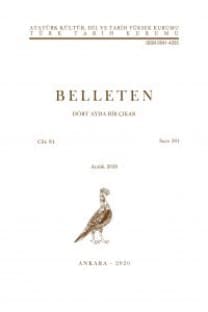Türk Tarih Kurumu Genel Kurul Toplantısı (25 Nisan 1975)
Türk Tarih Kurumunun 1975 yılı olağan Genel Kurul toplantısı 25 Nisan 1975 Salı günü saat 10,15 de Kurum merkezinde yapıldı. Saat 9,30 da üyeler Atatürk'ün Anıtkabirini ziyaret ederek saygı duruşunda bulundular ve bir çelenk koydular. Daha sonra Kurum merkezine gelindi ve Genel Kurul toplantısına başlandı. Başkan Ord. Prof. Enver Ziya Karal çoğunluğun bulunduğunu söyleyerek kısa bir konuşma ile oturumu açtı ve 18 Ocak 1975 de kaybettiğimiz asli üyemiz Ord. Prof. Dr. Arif Müfid Mansel'in anısı için üyeleri bir dakika saygı duruşuna çağırdı. Genel Kurul'un bu toplantısına Kıbrıs'tan misafir olarak katılan Kıbrıs Türk Tarih Kurumu Başkaniyle iki Yönetim Kurulu üyesini Başkan Genel Kurul'a takdim etti. Daha sonra geçen Genel Kurul'da Kurum'un asil üyeliğine seçilen Prof. Dr. Mebrure Tosun, Prof. Dr. Neşet Çağatay, Prof. Dr. Coşkun Üçok, Ord. Prof. Reşat Kaynar ve Prof. Dr. Lütfi Güçer'le, muhabir üyeliklere seçilen Prof. Dr. Oktay Akşit, İbrahim Artuk, Necati Dolunay, İsmet Parmaksızoğlu ve Raci Temizer'e diplomaları verildi.
Anahtar Kelimeler:
Türk Tarih Kurumu, Genel Kurul Toplantısı, 25 Nisan 1975
A further note on the French Newspapers of İstanbul during the revolutionary period (1795-97)
In his `Note sur les journaux français de Constantinople â, l'époque révolutionnaire, L. Lagarde threw important light on a hitherto obscure aspect of the propaganda effort of the Directory within the Ottoman Empire. The purpose of this additional note is to amplify and, in certain respects to correct, Lagarde's earlier contribution on the basis of the reports, now in the Public Record Office in London, of the British Minister to the Ottoman Porte, J. Spencer Smith. For inevitably, during the crucial years immediately before Bonaparte's Egyptian expedition of the summer of 1798 and the consequent Ottoman declaration of war on France, Spencer Smith kept a close watch on the activities of his French rival in İstanbul and the Levant. Succeeding Sir Robert Liston in 1795, Spencer Smith showed himself markedly fearful of what he termed 'the destructive doctrines so progressive in the present day' and the threat posed by French propaganda activities in the Levant.
- ISSN: 0041-4255
- Yayın Aralığı: Yılda 3 Sayı
- Başlangıç: 1937
- Yayıncı: Türk Tarih Kurumu
Sayıdaki Diğer Makaleler
The Byzantine-Turkish Fountain in the Archaeological Museum of İstanbul
The Relation between Urartian Temple Gates and Monumental Rock Niches
A further note on the French Newspapers of İstanbul during the revolutionary period (1795-97)
Dediği Dede and Dervish Lodges
Türk Tarih Kurumu Genel Kurul Toplantısı (25 Nisan 1975)
Urartu Tapınak Kapıları ile Anıtsal Kaya Nişleri Arasındaki Bağlantı
